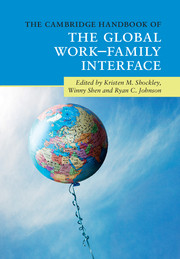Book contents
- The Cambridge Handbook of the Global Work–Family Interface
- The Cambridge Handbook of the Global Work–Family Interface
- Copyright page
- Contents
- Figures
- Tables
- Contributors
- Part I Overview
- Part II Assessing Cultural and Structural Differences
- Part III Methodological Considerations
- Part IV Review of Research in Regions across the Globe
- Part V Cultures within Cultures
- Part VI Organizational Perspectives
- Part VII Family Perspectives
- Part VIII Individual Perspectives
- Part IX Conclusion
- Index
- References
Part IX - Conclusion
Published online by Cambridge University Press: 16 April 2018
- The Cambridge Handbook of the Global Work–Family Interface
- The Cambridge Handbook of the Global Work–Family Interface
- Copyright page
- Contents
- Figures
- Tables
- Contributors
- Part I Overview
- Part II Assessing Cultural and Structural Differences
- Part III Methodological Considerations
- Part IV Review of Research in Regions across the Globe
- Part V Cultures within Cultures
- Part VI Organizational Perspectives
- Part VII Family Perspectives
- Part VIII Individual Perspectives
- Part IX Conclusion
- Index
- References
Summary

- Type
- Chapter
- Information
- The Cambridge Handbook of the Global Work–Family Interface , pp. 747 - 756Publisher: Cambridge University PressPrint publication year: 2018

